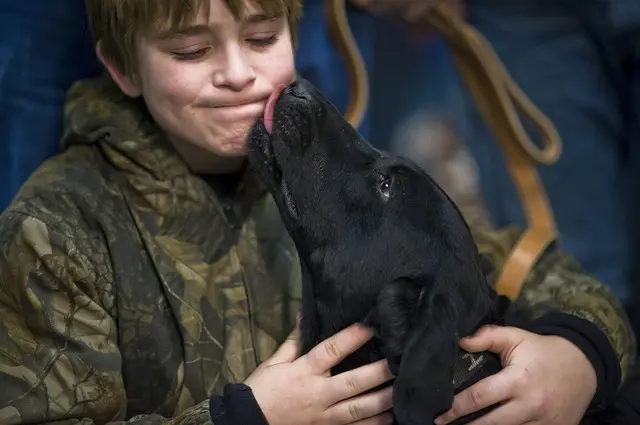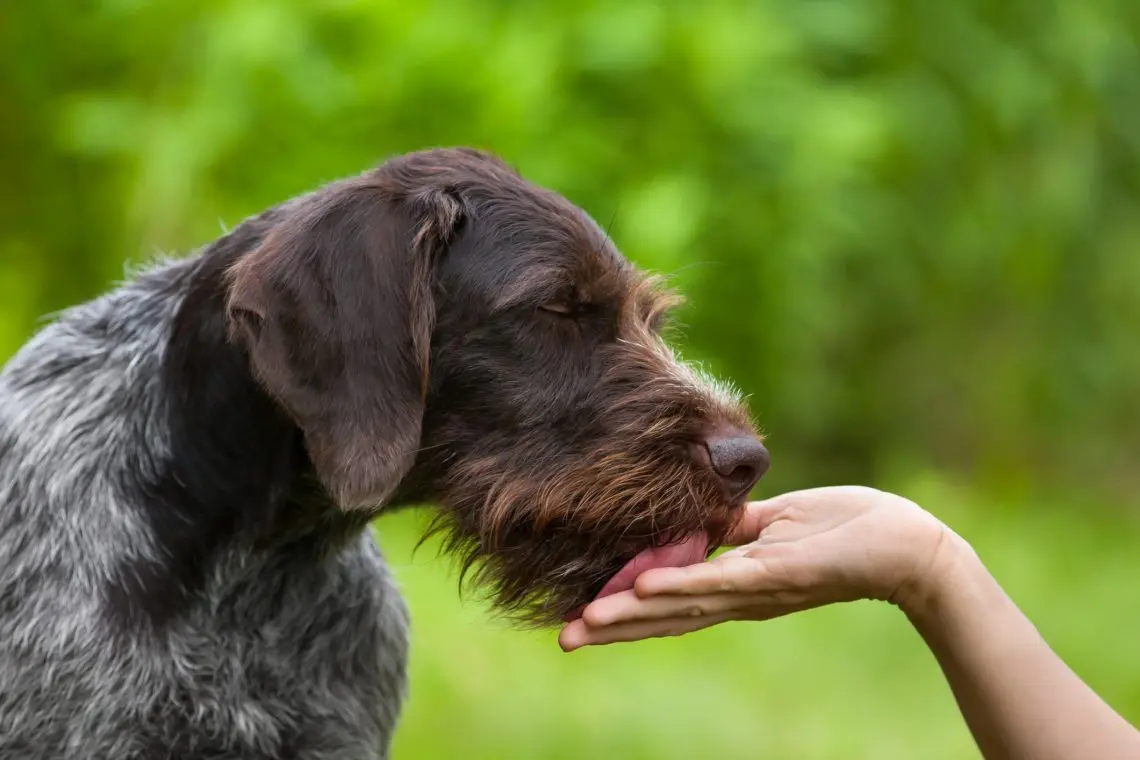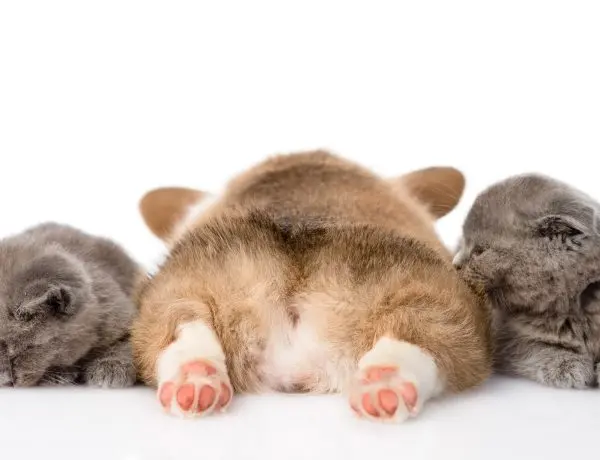Licking is a common behavior for many dogs. Although some people love getting “kisses” from their pooches, others do not. Is this a trait that you can avoid by choosing a particular breed? Let’s find out!
While I was unable to find any data that verified licking is an actual breed trait, there are many different reasons that dogs lick humans. These reasons are often related to personality traits, and since each breed has typical personality traits, it can be assumed that some breeds are less likely to lick than others.
Since it is believed that licking is, in part, a sign of affection in dogs, it makes sense that the less obviously affectionate breeds would tend to lick less. Dogs bred to work independently from humans tend to be less openly affectionate to us and, therefore, may lick less than other breeds. Sighthounds (Greyhounds, Salukis, Borzoi, etc.) and Arctic breeds (Siberian Husky, Alaskan Malamute, American Eskimo, etc.) fall into this category, and some people have noticed these breed lick less than others. Whereas breeds that work closely with humans, and especially those that are mouth oriented breeds (such as Labrador Retrievers, Golden Retrievers, Poodles, etc.) often lick more. That would suggest there is a possible correlation (although not confirmed) between breed and tendency to lick.
Table of Contents
Why Do Dogs Lick?
The licking behavior demonstrated by our domestic dogs is believed to be instinctual and appears to be similar to the behavior of wolf pups that lick their mothers’ muzzles, causing them to regurgitate food for the puppies. Quite possibly, domestic dogs transferred this licking behavior of other each other onto humans when we became their primary care-givers many thousands of years ago. Although the behavior started as food-seeking behavior, it is likely that it then became a ritualized greeting dogs offered to one another. That would mean when a dog licks another dog’s face or a human’s hands, he is affectionately telling them that he is happy to see them.

However, affection is not the only reason dogs lick. There are other reasons for licking that seem to align more with personality traits rather than breed characteristics. For instance, licking is often a sign of submission. But within one litter, it is not uncommon for there to be puppies that are more submissive than their dominant brothers and sisters.
Licking is a way that a dog can self-soothe themselves. It releases “feel-good” hormones (called endorphins), so a submissive dog with less confidence may be more likely to lick. This self-soothing behavior is a way of dealing with stress and anxiety, so a dog that does not deal with stress as well might lick more than a well-adjusted dog. If your dog is licking for these reasons, you may be able to reduce their licking by improving their confidence with some training!
Are There Medical Reasons Your Dog Is Licking?
A sudden, increased amount of licking can sometimes signal a medical issue with your dog. A dog that suddenly licks a particular area may be experiencing pain in that area (especially if it is near a joint) or trying to clean a wound. Experiencing an itch will also cause a dog to lick, so a dog that is licking their feet may be alerting you to the fact that they have allergies. Obsessive licking, especially after eating (and primarily if your dog licks an inanimate object such as their bowl, the floor, or the carpet), could be experiencing gastrointestinal problems. If you observe any of these behaviors, please make an appointment to see your veterinarian before doing anything else!
What Are Some Other Reasons Dogs Lick?
There are a couple less scientific reasons as well for a dog licking us. One is that dogs simply like the taste of our skin. We may notice our dogs licking us more when we sweat or use lotion, as well if we have any left-over remnants of food on our hands. Make sure to wash your hands after eating and distract your dog after you apply lotion (with a walk or training session) if you want to deter your dog from licking you.
Dogs are smart, and they quickly learn how to get what they want! If licking gets them attention, they are more likely to continue the action. Remember, any attention is better than none in a dog’s eye – both positive and negative! If your pup licks you and then you pet or praise him, he will lick you again! By the same token, if he licks you and you squeal “Eewwww! Yuck!” and try to push him away, he still received attention and is more inclined to repeat the behavior. This mildly negative attention that we humans are so good at giving is the cause of many behavior problems in our dogs.
How Do You Increase Your Chance of Having a Dog That Does Not Lick?
- Choose a breed that is not overly affectionate and tends to work more independently from humans. That means that you should probably take Labrador Retrievers and Golden Retrievers off of your list, along with many other Sporting breeds and several Toy breeds as well. Not to say that every dog in those categories will be a compulsive licker, but you might as well stack the odds in your favor and look for a more independent breed. Breeds described as “aloof with strangers” might be an excellent option to explore.
- Choose a confident puppy. We know that licking can be a submissive behavior, therefore choosing a more independent puppy may reduce your chances of bringing home a dog that cannot seem to control his tongue. I was unable to find any studies on how much early-neurological stimulation (ENS) affects licking problems in dogs. Still, ENS is proven to produce more confident puppies that are better at dealing with stress. Therefore, you may want to search for a breeder that implements programs such as Puppy Culture and Super Dog in hopes that you will end up with a puppy better prepared to deal with the challenges of life without resorting to the self-soothing behavior of compulsive licking.
- Closely monitor your dog’s health. Do not forget to check for any wounds, allergies, gastrointestinal issues, or possible pain that may be contributing to the licking as well. If a medical concern is the cause of your dog’s licking, it will not go away if you do not solve the medical problem. Although licking can be a sign of medical issues, what starts as a signal that something is physically wrong can then turn into a habit. That is especially true if you are not careful about discouraging the behavior.
- Train your dog not to lick. If you already have a licking dog, this might be a more challenging task, but you can at least give it a try! Make sure NOT to reward your dog for licking you – this means NO attention at all. Take your hands away (or whatever body part they are licking) and look away from your dog. When they interact with you without licking, be sure to give them lots of praise and attention. It may also be helpful to distract them with a chew toy or other object for them to focus on rather than you at this time. Keeping your dog busy is always beneficial, as licking tends to be an activity they do when they are bored. Teach your dog some new commands or tricks to take their focus off licking you. If you work on building up his confidence and teaching him to deal with stress and anxiety better, the licking problem may very well go away on its own.

Although there may be some breeds more prone to licking, it comes down to many other factors as to whether a dog will lick excessively or not. Some of these factors can be controlled with proper training. Unfortunately, there is not a definitive list of dog breeds that do not lick. But if you take a look at the breed’s characteristics and personality traits, you increase your chances of ending up with a dog that does not have a licking obsession.




